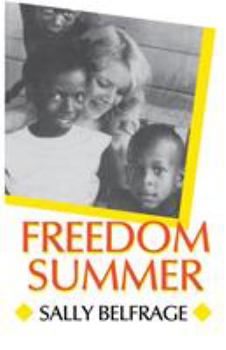Freedom Summer
(Part of the The Carter G. Woodson Institute Series: Black Studies at Work in the World Series)
Select Format
Select Condition 
Book Overview
Freedom Summer is a richly detailed account of a young white woman who participated in the Student Nonviolent Coordinating Committee's summer project in Mississippi in 1964. The text covers one intense summer from the basic training session in June to the Democratic Convention in August.
Format:Paperback
Language:English
ISBN:0813912997
ISBN13:9780813912998
Release Date:September 1990
Publisher:University of Virginia Press
Length:246 Pages
Weight:0.92 lbs.
Dimensions:0.9" x 5.5" x 8.4"
Grade Range:Postsecondary
Related Subjects
Africa African Americans African-American & Black African-American Studies Biographical Biographies Biographies & History Biography & History Education & Reference Ethnic & National Ethnic Studies History Modern (16th-21st Centuries) Politics & Social Sciences Social Science Social Sciences Specific Demographics State & LocalCustomer Reviews
2 ratings
The Long, Hot Summer
Published by Thriftbooks.com User , 19 years ago
This past June, the State of Mississippi successfully prosecuted and convicted Edgar Ray Killen for his involvement in the murder of three civil rights workers during the summer of 1964. Judging by the national attention paid to this forty year old case, the psychic wounds from America's civil rights battles refuse to scar over. The murdered youths - Andrew Goodman, James Chaney and Mickey Schwerner - were part of The Summer Project, which was a desperate call for help from SNCC, the Student Non-Violent Coordinating Committee. SNCC leaders understood that few Americans cared enough about the routine beating and jailing of blacks to force Mississippi to change its lawless ways. But if white college students were treated like Mississippi's blacks, outrage, and perhaps federal intervention, would follow. SNCC (working through COFO, an umbrella civil rights group) put out a call for white volunteers who would plug into education and voter registration projects throughout the state and about a thousand volunteers responded. These young men and women, most of them students from elite colleges, were in many ways the best of their generation: compassionate, accomplished, idealistic. One of the volunteers, Sally Belfrage, wrote this beautifully observed account of her two turbulent months in Mississippi. Belfrage was assigned to Greenwood, a Delta town mired in the old-time cotton economy and the racial exploitation required to run it. Greenwood also happened to be SNCC's state headquarters and to have Stokely Carmichael as its local SNCC project director. Greenwood, SNCC,and the Summer Project made for a volatile mix. The white volunteers boarded in black homes, and both they and their hosts were continually harassed, beaten and jailed for minor or imaginary infractions of local laws. (Belfrage herself spent several days in the local jail after being arrested at a protest march.) She is especially good at analyzing and describing her own emotional states, honestly portraying the fear, exhaustion and exhilaration of fighting on the front lines during the active combat phase of America's race wars. The prose in which she paints Greenwood and the daily struggles of its African-American residents is detailed, insightful and often poetic. The last part of the book, which describes the rifts in the black community between the non-violent and direct action advocates is particularly riveting, and foreshadows the subsequent struggles in the civil rights movement. Freedom Summer provides a vivid snapshot of one Mississippi town during that long, hot summer, and one white woman's acute observations about what occurred there. What's missing is any effort to place the summer's struggles within the historical context of the civil rights movement. In particular, black SNCC field workers displayed almost unimaginable courage during the two years prior to the Summer Project as they ventured alone and unarmed in into brutal racist enclaves. The physical
The Civil Rights Movement from a worker's point of view
Published by Thriftbooks.com User , 24 years ago
_Freedom Summer_ is a richly detailed account of a young white woman who participated in the Student Nonviolent Coordinating Committee's summer project in Mississippi in 1964. The text covers one incredibly intense summer from the basic training session in June to the Democratic Convention in August. I will assign this text in my Civil Rights Autobiography course next semester because, aside from being a clearly-written account of a chaotic time, it will answer some of the questions I know my students will have, such as: what was it like to be a Civil Rights worker? what was it like to be arrested and thrown in a Mississippi jail? what were the day to day activities of people working in the Movement? how were the workers received by the black and white communities? or how do you decide go enter Mississippi after you've just learned that three summer project workers have disappeared and are presumed dead?






